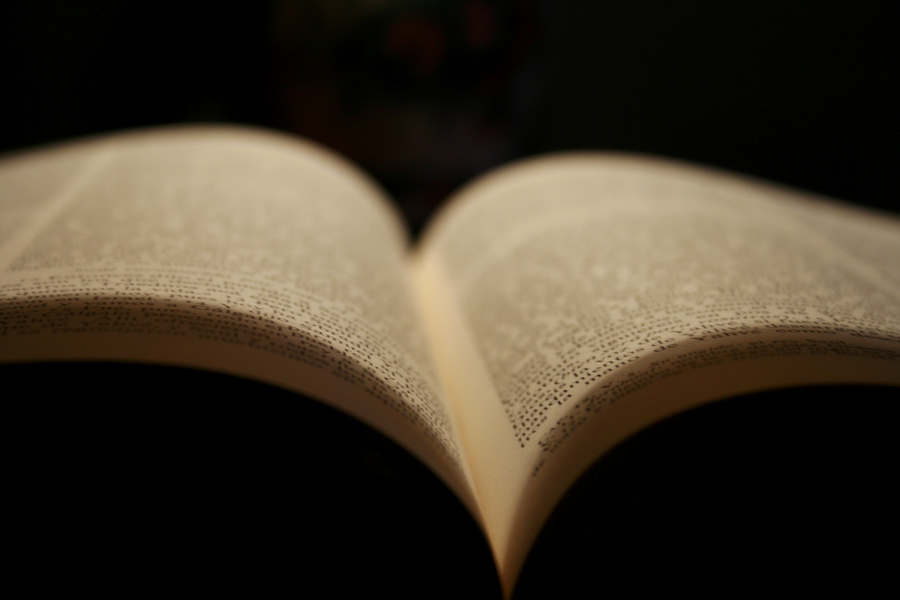Books and publications
Index / Activities / Books and publications / Balqís-Casa Árabe reading club
Balqís-Casa Árabe reading club
From April 28, 2016 until November 30, 20168:00 p.m
MADRID
Casa Árabe Auditorium (at Calle Alcalá, 62).
8:00 p.m
Free entry, though you must register first to attend.
Those interested must sign up at least ten days in advance for each session by writing to the e-mail address: libreriacasaarabe@gmail.com
In Spanish.
The Balqís bookshop and Casa Árabe have created a new space to give the public a closer look at Arab literature and thought.
At the Balqís-Casa Árabe Reading Club, both classical works and contemporary authors will be read and discussed, as well as the latest publications in the Arabic language.
This reading club was created with the purpose of forming an ongoing group of people who are faithful literature lovers, but also to bring together anyone who wishes to learn more, through novels, essays, poetry and comics, about the legacy of Arab culture and its influence on thought and the social sciences, as well as the current socio-political situation in the Arab world, from different perspectives and through various forms of expression, as a complement to the regular conferences which are held by Casa Árabe.
With this initiative, we hope to contribute to increasing awareness about great names in Arab literature, which, thanks to translators, publishers, bookstores and certain institutions, are gradually becoming easier to access for readers in our country. To do so, we will rely on the inestimable help of individuals with great knowledge about Arab authors, whose book proposals and debate sessions held after reading the books will enrich the reading of these works.
The Balqís bookshop will be providing special discounts on the price of the books chosen for this reading club.
Those interested must sign up at least ten days in advance for each session, by writing to: libreriacasaarabe@gmail.com
Twitter: @LibreriaBalqis and @Casaarabe
-
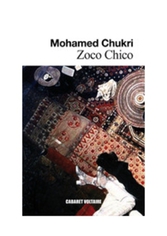
Zoco Chico
May 19, 20168:00 p.m.MADRIDHall of Columns (Casa Árabe, at Calle Alcalá, 62). 8:00 p.m. Free entry after registration.In SpanishFirst session of the Reading Club organized by Casa Árabe and the Balqís bookshopThis first reading club session, for which those participating will read and discuss the work “Zoco Chico” by Mohamed Choukri, will be presented by Gonzalo Fernández Parrilla.“Zoco Chico is the chronicle and fiction of a city, Tangiers, turned into a magnet attracting writers and musicians from Europe and America. In the late sixties, it began to lose its international, cosmopolitan, bohemian soul, being transformed into yet another space forming part of the very essence of traditional Morocco. Zoco Chico is a multidimensional, variegated narration filled with dialogue, ingenious peeks at the initial journey of hippies and their psychedelic delirium, steeped with biblical, mythical and literary evocations. Within the very characteristic world created by Choukri, between the sensual and the sexual lies everything from urban “medina” strolling (as Juan Goytisolo might call it) to cutaneous eroticism. All in a tumult of bodies, spaces, languages and times in a city whose past has gone away, as its present faces and its future becomes impossible to envisage. Zoco Chico holds within the writer’s poetic heartbeat and his epic cunning,” by Gonzalo Fernández Parrilla.Gonzalo Fernández Parrilla is a professor of Arab and Islamic Studies at the Universidad Autónoma de Madrid. Author of La literatura marroquí contemporánea (Contemporary Moroccan Literature), and publisher of works such as Orientalismo, exotismo y traducción (Orientalism, Exoticism and Translation). Translator, along with Malika Embarek, of Diario de un ilegal (Diary of an Illegal) by Rachid Nini and Marruecos, Sáhara… (Diarios 1974-1981) [Morocco, Sahara... (Diaries of 1974-1981)] by another Moroccan author, Abdallah Laroui.Book information:Zoco Chico, by Mohamed ChoukriISBN: 978849444348Translators: Karima Hajjaj and Malika EmbarekPublisher: Cabaret Voltaire
Organize:Cara Árabe and the Balqís bookstore -
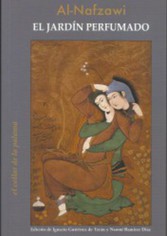
The Perfumed Garden
June 21, 20168:00 p.m.MADRIDHall of Columns (Casa Árabe, at Calle Alcalá, 62). 8:00 p.m. Free entry after registration.In Spanish.Second session of the Reading Club organized by Casa Árabe and the Balqís bookshopOn this occasion, the book to be read and discussed is The Perfumed Garden by Al-Nafzawi. It will be presented by Abdul Hadi Sadoun.“The Perfumed Garden” is probably the most highly praised and often translated work of erotic Arab literature. This work, written in Tunisia in 1535, is surprising because it is so natural and lacks moral conventionalisms in dealing with romantic relationships. Also to be highlighted is its acknowledgment of women as an active party in the romantic encounter, and the fact that it makes female pleasure, greatly lacking in treatises on this subject matter, more visible. The book deals with erotic relations in the form of short stories, anecdotes, experiences and parables. In the words of its publishers, it reminds us of a time when “deliberation over sexual practices and the pleasure of the sexual act, including detailed descriptions of positions and aphrodisiacs, was something common in literary texts and Islamic jurisprudence.”Abdul Hadi Sadoun was born in Baghdad in 1968 and currently lives in Madrid. He is a writer, Hispanist and publisher. He has published dozens of books in Arabic and Spanish, most notably including Campos del Extraño (published by Alhulia, 2010) and Memorias de un perro iraquí (Memories of an Iraqi Dog, published in Spanish by Calambur, 2016).Book information:The Perfumed Garden, by Cadi al-NafzawiISBN:9788496327696Publisher: Ediciones del Oriente y del MediterráneoTranslators: Iñaki Gutiérrez de Terán and Naomi Ramírez
Organize: Cara Árabe and the Balqís bookstore -
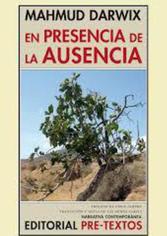
In the Presence of Absence
September 29, 20168:00 p.m.MADRIDHall of Columns (Casa Árabe, at Calle Alcalá, 62). 8:00 p.m. Free entry after registration.In SpanishThird session of the Reading Club organized by Casa Árabe and the Balqís bookshop.On this occasion, we will be reading and discussing the work In the Presence of Absence, to be introduced by Luz Gómez.In the Presence of Absence is the poetic autobiography of Mahmoud Darwish (1941-2008): “The Nakba in 1948, the PLO’s departure from Beirut in 1982, seeking refuge in Tunisia and his return to Gaza in 1994 are all historical moments which Darwish deals with in In the Presence of Absence. Of his three books in prose, all of which are somewhat autobiographical (Diary of the Usual Sadness, Memory for Forgetfulness and this book), In the Presence of Absence is the most biographical and poetic, because the events are dispossessed of their alleged occurrence.In this sense, the work is not an autobiography at all: memory does not play its usual judgmental role. Memory fails to remember. Absence, which means living the present while all experiences remain possible, is his active form of expression. Calling for a union between writing, memory and the present is practically unnecessary in Darwish’s latest works, because they are not dissociated in the mindset of the absent/poet” (from the Prologue by Jorge Gimeno).Luz Gómez García, a professor of Arab and Islamic Studies at the Universidad Autónoma de Madrid, is the author of Diccionario de islam e islamismo (Dictionary of Islam and Islamism) and Marxismo, islam e islamismo: El proyecto de Adil Husayn (Marxism, Islam and Islamism: The project by Adil Husayn). In 2012, she was awarded the National Translation Prize for her version of In the Presence of Absence by Mahmoud Darwish. She has also translated works by Gibran Khalil Gibran, Abbas Beydoun, Sargon Boulus and Hanan al-Sheykh. She is a contributor to the El País newspaper.Book information:In the Presence of Absence, by Mahmoud DarwishPublisher: Pre-textosISBN: 9788415297505 -
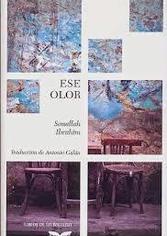
That Smell
November 02, 20168:00 p.m.MADRIDHall of Columns (Casa Árabe, at Calle Alcalá, 62). 8:00 p.m. Free entry after registration.In SpanishFourth session of the Reading Club organized by Casa Árabe and the Balqís bookshopOn this occasion, we will be reading and discussing the book That Smell by Sonallah Ibrahim, presented by Nieves Paradela.That Smell, published in 1966, is one of the most representative novels from what is now referred to as the “Generation of the Sixties” in Egypt, a group of writers who started a new concept and form of practice in literary work, thereby distancing it from the dominant models existing up to that time.A plot thinned down to the greatest degree possible, short, bare phrases with rhetorical ornamentation, and characters lacking the slightest bit of patriotic epic: these are just a few of the characteristics with which Sonallah Ibrahim instilled his work, so greatly annoying the conservative critics of the day. He did not escape the direct action of political censorship either, another ironic way of recognizing the strength emanated by this brief, seemingly dispassionate novel.Nieves Paradela is a professor of Arab Studies at the UAM. Her topics of research include the Arabic language and teaching Arabic, contemporary Arab literature and its translation, and the intellectual history of the modern Arab world. Amongst other works, she is the author of Manual de Sintaxis Árabe (Arabic Syntax Handbook, UAM, 1998) and El otro laberinto español. Viajeros árabes a España entre el siglo XVII y 1936 (The Other Spanish Labyrinth: Arab travelers to Spain from the seventeenth century to 1936, Madrid, Siglo XXI, 2005). She has translated works by Lebanese, Palestinian, Egyptian and Tunisian authors.Book information:That Smell, by Sonallah IbrahimISBN: 9788483444016Publisher: Libros de la Ballena -
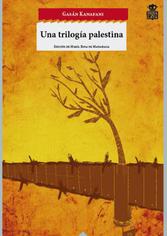
The Palestine Trilogy by Ghassan Kanafani
December 13, 20167:30 p.m.MADRIDCasa Árabe (at Calle Alcalá, 62). 7:30 p.m.In SpanishFifth session of the Reading Club organized by Casa Árabe and the Balqís bookshopIn one single volume, this Palestinian trilogy brings together the main three novels by Ghassan Kanafani, with which he built the foundations of Palestinian literature in exile. Until his premature death, Kanafani became the greatest force for renewal in contemporary Arab literature.Men in the Sun (1963) tells the parallel stories of three Palestinian men from three different generations who meet to try to make a clandestine escape from the refugee camps where they live. With each of them, Kanafani evokes the different positions taken within Palestinian society after the declaration of the State of Israel and later defeat of the Arabs.In All That’s Left of You (1966), we are told the story of two siblings, Hamed and Mariam, both of whom are facing their destiny: Hamed does so against the desert and time, and Mariam against an abusive husband who wants to disown her. This work caused a commotion in Arab literature because of its innovative structure, because it includes several narrative voices which are juxtaposed and includes static elements (such as the desert and time) as protagonists.Um Saad (1969) introduces the renewed hope of the Palestinians after the defeat of the Arab armies in the Six-Day War. Through the voice of Um Saad, a Palestinian woman and mother to a boy who enrolls with the Fedayeen, Kanafani creates a beautiful story of liberation and hope, that which is held by the new generations in the fight for their future, which must bear its fruits, just like the dry grapevine that Um Saad plants one day in front of her house.Ghassan Kanafani is the figure who brought great renewal to Arab and Palestinian literature. He created unseen narrative structures in his language and updated the subjects dealt with, thereby founding the Palestinian literature of exile.The translator, María Rosa de Madariaga, has a degree in Romance Philology, a PhD in History and a diploma in Arab Literature and Civilization. She has worked as a translator with UNESCO and authored several books on the history of relations between Spain and Morocco.

